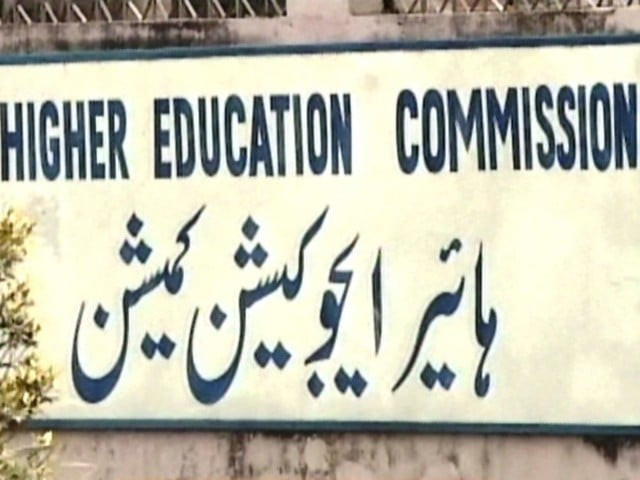HEC struggles to ensure standards
Varsities violating rules continue to ignore repeated warnings

Higher Education Commission. PHOTO: FILE
The warning, however, might not bear fruit as HEC does not have power to take action against such violators except issuing warnings, notices and reminders about their lack of quality.
The Prime Minister Office sprung into action on November 4 following protests by students from Bahauddin Zakaria University Multan’s Lahore campus after their campus was declared illegal.
The Punjab government had earlier approved the project in 2013 on condition of getting approval from its syndicate and the federal higher education body but the campus went ahead and enrolled students.
Disdainful DAIs
In a presser, HEC chief Dr Mukhtar Ahmed reiterated that a new team will start visiting 172 degree-awarding institutes (DAIs) to ensure quality of education and also look into other measures. This campus is not the only one but there are about 160 such campuses on the HEC’s website which have yet to get a no-objection certificate.
Ahmed did not respond when asked by The Express Tribune as to what new techniques or tools would be used by the HEC against violators. “The team will check quality pointers and inform provincial governments,” he said.
In September, HEC published a half-page ad in newspapers warning institutes to abide by set rules while establishing sub-campuses, awarding affiliation to degree colleges or initiating a programme with foreign collaboration. Interestingly, around 57 public universities have granted affiliations to 3,328 colleges across the country.
A prime example is of Ghazi Degree College in Dera Ghazi Khan which has changed its affiliation with three universities in the past three years.
Lack of infrastructure, insufficient staff, laboratories and other basic facilities are some of the issues universities overlook while granting affiliation to colleges. The HEC chief in his presser said they have nothing to do with colleges but could not explain when asked how it was not their issue when public sector varsities were granting affiliations.
Quality conundrum
The biggest concern when it comes to these degree-awarding institutes is quality of education and lack of checks. HEC’s review committees have been visiting and preparing lists of institutes running programmes below standard, not fulfilling minimum criteria and those violating other measures. But either the institutes have been tricking HEC into making makeshift arrangements to do away with visits or are just ignoring the directives.
Interestingly, after establishment of provincial higher education bodies in Punjab and Sindh, institutes tell HEC they are answerable only to the provincial government.
To ensure all this, HEC has also established Quality Enhancement Cells in 143 varsities but anomalies like fixing number of required faculty, meeting quality standards, check on plagiarism, etc are never underlined and hushed up for good reasons. About 21 teachers including a dean are still working despite being blacklisted by the HEC.
Visiting the archives of newspapers from 2003-04, HEC founder Dr Attaur Rehman was also quoted saying no such institute would be allowed in the country but the reality is the other way around.
Published in The Express Tribune, November 8th, 2015.



















COMMENTS
Comments are moderated and generally will be posted if they are on-topic and not abusive.
For more information, please see our Comments FAQ